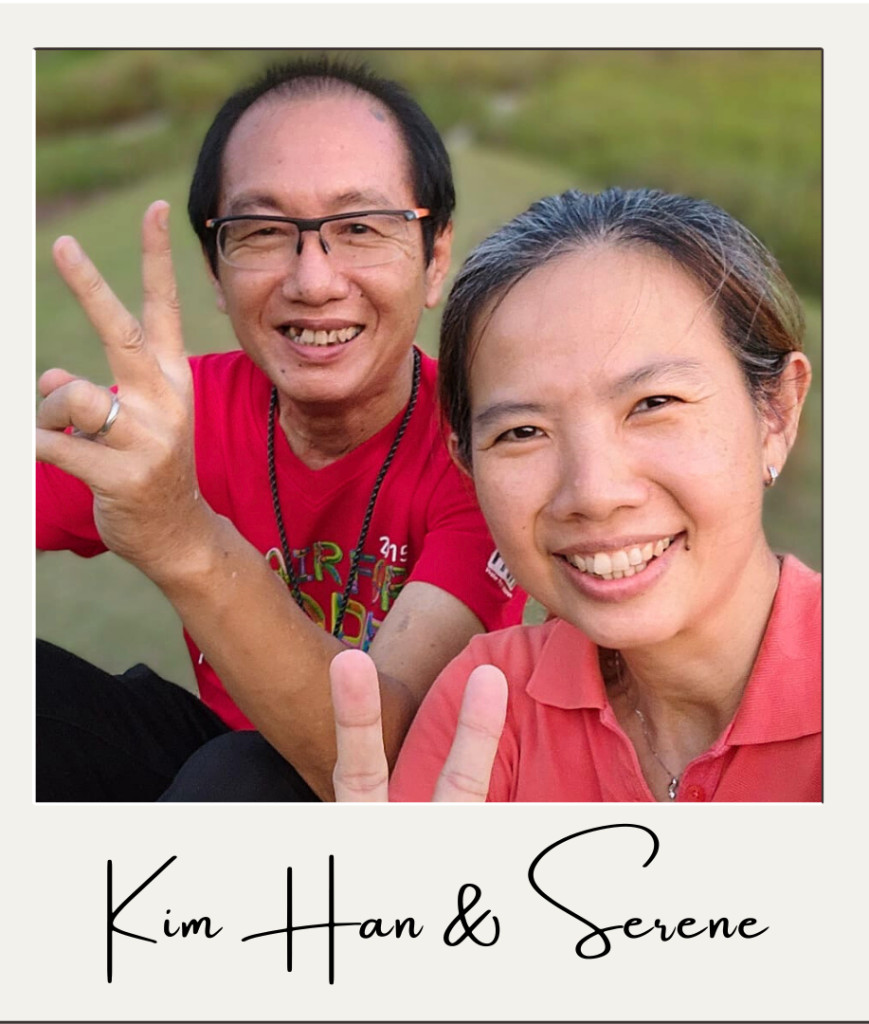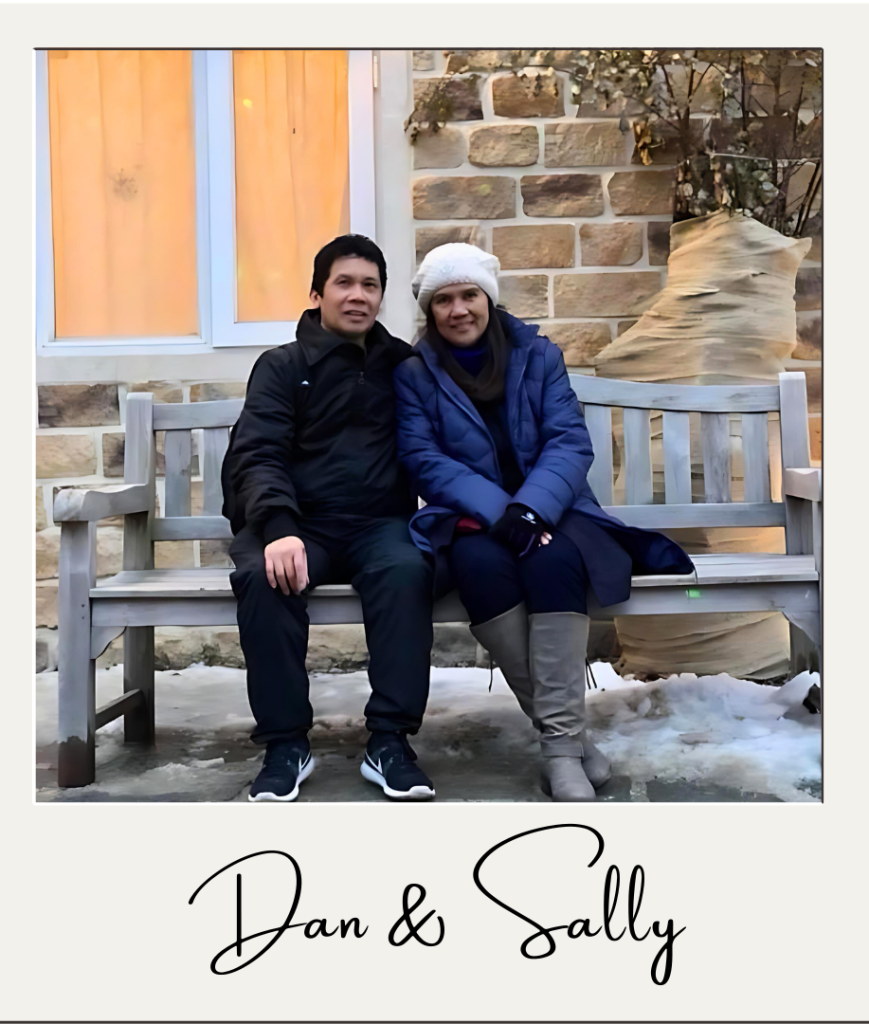Playback speed:
The best way to understand the complexities surrounding dementia is to speak directly to someone who is living with it or someone caring for a person with the condition. We are fortunate to hear from two caregivers, or as they prefer to be called, care partners, Sally Ridon and Serene Toh. As care partners, Sally and Serene emphasise the collaborative nature of caregiving, underscoring that it is not just about providing assistance but working together in a partnership of care and support.

Serene embarked on her caregiving journey when her husband, Kim Han, was diagnosed with Young Onset Dementia in 2021. Faced with the dual challenge of his diagnosis and unemployment, Serene left her full-time job to care for him, navigating the complexities of dementia with determination and resilience.

Sally’s caregiving journey began when her husband, Dan, was diagnosed with Young Onset Dementia following a heart attack in 2020. Drawing strength from her Catholic faith, Sally stepped into her new role with unwavering love and dedication, balancing her responsibilities with a proactive approach to understanding and managing the condition
Their stories, experiences, and insights shed light on the multi–faceted nature of caregiving for persons living with dementia. Read on to find out what they want you to know about dementia and the caregiving experience.
To Members of the Public
One of the common misconceptions about dementia is that it solely affects memory. Both Serene and Sally stressed that dementia impacts various aspects of life, often in significant ways.
In the initial stages of her journey as a care partner, Serene would meticulously write out instructions for Kim Han, believing it would help him navigate daily life post-diagnosis since she was under the impression that his main issue was not being able to remember things. However, when he struggled to understand and follow these instructions, frustration set in. Serene would question why Kim Han was not trying hard enough. It was only later, as she gained more knowledge about the condition, that Serene realised dementia also impairs cognitive abilities, making it difficult for him to understand and follow instructions. This insight was crucial for her to adjust her caregiving approach.
Sally echoed this sentiment, emphasising that dementia also changes behaviour and requires a comprehensive understanding of its multifaceted nature. Sally recounted a poignant moment when Dan’s behaviour shifted unpredictably during a Christmas celebration at home with the family. Amidst conversation and laughter, Dan abruptly became overwhelmed and loudly requested silence. Everyone at the party was shocked, and Sally swiftly guided him to a quieter area to soothe him.
Through their personal stories, both Serene and Sally illustrated the profound impact of dementia on cognitive abilities and behaviour, emphasising the need for a comprehensive understanding of the condition to provide effective care and support.
Maintaining the dignity and identity of persons living with dementia is vital. Serene ensures Kim Han feels included in social interactions, prompting his participation to reinforce his sense of belonging. This helps maintain his self-esteem and emotional well-being. For example, during casual chats with friends, Serene always involves Kim Han by asking him questions like, “That was so funny, wasn’t it?”. This approach helps him feel included as part of the conversation, even if he does not remember specific details.
Sally adopts a similar approach by adapting Dan’s lifestyle to make things “the same but not the same.” In other words, making adjustments to his environment and daily routines to maintain a sense of familiarity while accommodating his changing needs and abilities. For instance, persons living with dementia may have difficulty managing their finances. However, Sally places expired credit cards and foreign currency in Dan’s wallet, allowing him to maintain a sense of financial responsibility for his family. Dan takes pride in possessing a wallet, often counting and arranging his money in it. This approach affirms his identity and dignity, which supports his sense of self-worth.
Moreover, Sally adopts an empowering approach in assisting Dan with daily tasks. Rather than taking over when Dan encounters difficulties, she engages him by doing these tasks together. For instance, if Dan forgets to use soap while washing dishes, Sally gently intervenes by standing beside him and suggesting, “We must use soap when we wash the dishes. Come, let’s do it together.” This approach empowers Dan and fosters a sense of capability rather than dependence.
One crucial aspect where assistance can be invaluable is aiding persons living with dementia who may become disoriented in public areas. Kim Han occasionally struggles with orientation and has difficulty communicating, especially with strangers. Serene wishes that in moments of confusion, someone would approach him kindly, offering assistance to ease his fear and loneliness. Small acts of kindness, like calling the care partner of the person living with dementia to let them know that their loved one is lost or just being a calming presence, can turn a distressing situation into a manageable one. These gestures can make a big difference, reducing stress and isolation for both the person with dementia and their care partner.
If you do not feel confident to offer practical assistance, Sally and Serene implored that members of the public be kind, empathetic and understanding. Public interactions pose challenges for both care partners and persons living with dementia. Serene recounted instances where Kim Han’s friendly gestures, like giving a thumbs-up to strangers, were met with judgment or confusion. She often found herself explaining his condition to mitigate misunderstandings. In these situations, she hopes for more understanding and less judgment, emphasising the importance of kindness and compassion towards those facing cognitive challenges
To Fellow Care Partners
Both care partners emphasised the importance of a strong support system. Serene found solace in the understanding and accommodations from her friends and family. They included Kim Han in outings and provided emotional support, which was invaluable for Serene’s well-being. Sally also appreciated small gestures from friends, such as offering a listening ear without any questions asked. Such support helped her feel less isolated and validated her experiences.
Programmes like the Dementia Social Club have also been particularly beneficial for Sally and Serene. This programme, which enables care partners to engage in purposeful activities with their loved ones, serves as a safe space for Sally and Serene to express their emotions, seek assistance, and offer support to others in similar situations. Sally also added that, in inclusive spaces like this, she does not feel the need to explain herself or Dan’s condition since everyone there is knowledgeable about dementia. This sense of community helps Sally and Serene feel less isolated and validates their experiences, knowing they are not alone in their journey.
Both Sally and Serene stressed that caregiving is a continuous learning process and it is normal to feel imperfect in this role. In their view, there is no such thing as a perfect care partner.
In caring for a loved one with dementia, it is important to approach situations with gentleness, especially when emotions run high. For example, when Kim Han makes a mess at home, Serene’s initial reaction might be frustration, but she reminds herself that he is not aware of his actions. Reacting with anger does not serve a purpose, and so she has learnt to step back and “filter the drama.” Reframing her mindset helps Serene focus on resolving the situation rather than directing blame.
This approach has helped Serene prioritise and maintain composure in challenging situations. For instance, if she needs to use the restroom while out with Kim Han and returns to find him missing, she remains calm, knowing that she will eventually locate him. This mindset shift has brought peace of mind to both of them, improving their overall well-being in such moments.
Similarly, despite the challenges she faces, Sally maintains a sense of peace, acknowledging that anxiety about the future is natural. Her advice to other care partners is to lean into aspects in your life that give you strength, such as your family or your faith, and take things one step at a time, embracing the mantra “que sera sera”.
In conclusion, the insights shared by care partners Sally and Serene shed light on the multifaceted nature of dementia caregiving. They stressed on the vital role of collaboration, compassion, and practical support in uplifting persons living with dementia, and call for inclusivity, urging us to create environments where every person with dementia feels valued and understood. They also reminded caregivers to seek help when needed and embrace the journey, imperfections and all, finding solace in community support and perseverance. Through their shared experiences, Sally and Serene extended not just guidance, but a heartfelt invitation to join them in fostering kindness and making a meaningful difference in the lives of those impacted by dementia.




